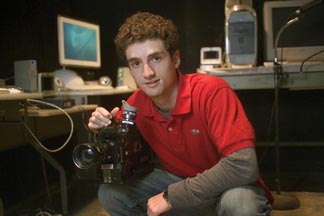Undergraduate research scholars travel, win awards and author papers
By Courtney Potts

Studying aggression in preschoolers; examining worker movements in South Africa; experimenting with a new state of matter called Supersolid He-4. Cornell University's Presidential Research Scholars (CPRS) are steeped in research.
Some travel to far places to conduct their research, often winning prestigious awards and even co-authoring scientific papers as undergraduate students.
Talk to anyone involved with the CPRS program and you will likely hear the phrase "opening doors" mentioned again and again. That is because, whether the door is to a professor's office, to an airbus or to an internship, opening doors is what CPRS does.
Established in 1996, the program is part of the Cornell Commitment triumvirate that includes Cornell Tradition and the Meinig Family Cornell National Scholars. It offers undergraduates a chance to work one-on-one with a faculty mentor while pursuing research in their chosen fields. Research scholars receive an $8,000 research stipend to use over the course of their Cornell career, and financial aid-eligible students are awarded a $4,000 student loan reduction.
The majority of students are selected during the freshman admissions process, although a handful are nominated for the program at the end of their sophomore year. Program coordinator Kristin Ramsay '88 says CPRS serves as a powerful incentive in the university's efforts to recruit "top-notch undergraduate researchers." In many cases, she explained, "the opportunity to do significant research early in their undergraduate years is something that [Presidential Research Scholars] couldn't find anywhere else, and that is why they're here."
The approximately 200 students involved with the program come from all seven of the university's colleges and represent a variety of academic backgrounds in physical, biological and social sciences and the humanities. Scholars are expected to remain actively involved in research, maintain a minimum 3.0 GPA and submit annual progress reports and evaluations from their mentors. The benefits that CPRS offers students more than justify these demands.
"The program has definitely been an experience for me," said Trevor White '07. "It's enabled me to do things that I wouldn't have had an opportunity to do if I was just an average student here ... especially an average film student."
White, who is majoring in film studies, has used money from his research fund to finance four short films produced at Cornell. His first, "Perfect," premiered at last year's Student Film Festival in Willard Straight Hall and received an award at the Columbia Film Festival.
White also believes that his involvement with CPRS helped him get his summer internship as a production assistant on the set of not-yet released movie, "Miami Vice." "In all honesty," White said, "I think that, had I not had this special something, I would have just been overlooked," a statement made more believable by the fact that he was the only intern on the entire production.
Stacey Guillen '06 used her funding to compare children's attitudes and behavior toward the environment in different countries. For her research she had to learn Portuguese, and then she went to Madrid, Spain, and Recise, Brazil, to conduct interviews with children between the ages of 6 and 9.
"[The CPRS staff] were very supportive in every way," Guillen said, adding that the program's networking opportunities were especially valuable. "I couldn't have done this without them."
By asking questions about such topics as pollution and recycling and using child-appropriate research tools such as the "worry thermometer" -- a drawing of a thermometer with various happy and sad faces designed to gauge children's emotional responses -- Guillen determined that Brazilian children are not as aware of environmental concerns as children in Spain. She and her faculty mentor, Gary Evans, professor of design and environmental analysis, hope eventually to publish the findings.
If they do, Guillen may well join a long line of Presidential Research Scholars who have received distinction for their work. Along with winning prestigious national awards, such as the Beinecke Scholarship and the Goldwater Fellowship, scholars also have had their work appear in such publications as National Geographic and Science. As just one example, research by Colby Neuman '05 on the mating habits of barn swallows was recently featured on the cover of the journal Science (Sept. 30, 2005).
"It is significant, extremely significant, for a student to be author or second author in such a distinguished publication," said Ramsay. "To do so as an undergraduate is almost unheard of."
Courtney Potts is a writer intern at the Cornell News Service.
Media Contact
Get Cornell news delivered right to your inbox.
Subscribe